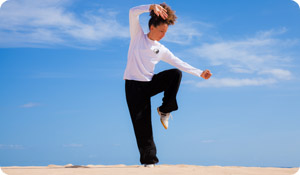
In Mandarin, tai chi literally means “ultimate fist,” but there’s nothing hostile about this gentle practice. In its initial form, tai chi was a martial art; legend has it that it was developed by a twelfth century Taoist after observing a crane preying on a snake in China’s Wu Dong Mountains. Early practitioners were taught to use an attacker’s aggression against him, rather than meeting it head on. But over time, tai chi has evolved into a slow-paced exercise that emphasizes balance, strength, and flexibility.
Andrew T. Gannon, PhD, professor of biology at Birmingham Southern College in Alabama, teaches a martial arts course that incorporates tai chi and has been an enthusiastic practitioner for three decades. "Tai chi is considered a soft martial art since the focus is on internal power—using your mind in a focused way—rather than external or physical force," he explains.
Tai chi movements are performed in a smooth, continuous fashion some describe as dance-like. Practitioners follow a teacher and move their arms rhythmically as they shift their weight from one leg to another. The benefits of this low-impact, weight-bearing activity include:
- Increased flexibility and muscle strength.
- Better stability from improved balance.
- Improved sleeping patterns.
- Pain relief in joints from diseases like osteoarthritis.
- Stress relief.
"In my experience as a teacher, the biggest rewards of tai chi come when you start to feel the effects of aging," says Gannon, who adds that it’s fairly common to see groups of older folks participating in tai chi every morning in parks near Asian communities. "Tai chi is a wonderful way to improve coordination and balance since the movements enable the muscles in the legs and hips to function in a more coordinated manner."
Research on Tai Chi
Scientific research on the health benefits of tai chi has been limited but noteworthy. In the US, several studies have identified tai chi’s ability to help prevent falls and increase heart health in the elderly. Gannon says some studies have indicated that tai chi enhances recovery from heart surgery and may help patients with chronic obstructive pulmonary disease (COPD). "It’s also been shown to be helpful for Parkinson’s patients and other people suffering from balance problems."
In addition, the National Center for Complementary and Alternative Medicine (NCCAM, part of the US Department of Health and Human Services) notes that tai chi may help improve older people’s immune systems, and a review of research found that the practice helped reduce study participants’ blood pressure.
Getting Tai Chi Into Your Life
Gannon, who started tai chi in his 20s, says it can be practiced at any age but is especially well suited to older individuals because it is gentle and low impact. "The other advantage is that tai chi requires no special equipment and can be done indoors or out," Gannon explains. "It’s also inexpensive, which is another big plus."
In fact, the toughest part of studying tai chi may be finding a good instructor, since the practice is not regulated by any government agencies. In traditional tai chi, instructors are trained by a tai chi master, and even though more than two million people participated in tai chi last year, according to NCCAM, teachers do not have to be licensed.
So what’s the best way to find a qualified teacher? Gannon recommends good, old-fashioned word-of-mouth: "Other people’s recommendations are often the best way to go about it, but to be sure the instructor is right for you, you need go to a few classes and see how it feels," Gannon advises. "Talk to any potential instructors and be sure they are interested in helping you improve yourself, because that is what tai chi is meant to do."
Gannon starts his day with a short tai chi session because, like many practitioners, it makes him feel great. "Tai chi requires patience to learn the movements, but it’s worth the investment of time. Give it a year and you will enjoy more increased and peacefulness," he says. "I started tai chi as a way to improve the flow of my martial arts practice, but 30 years later, I value the energy and peace tai chi brings me much more than when I started."
Perhaps one of his students described it best when he said, "Doing tai chi is like taking Valium, except you have energy."
Andrew T. Gannon, PhD, reviewed this article.
Sources
Gannon, Andrew T, PhD. Biology professor. Birmingham Southern College. Email interview. June 4, 2014.
"Tai Chi: An Introduction." National Center for Complementary and Alternative Medicine. Accessed 16 June 2014.
"A Gentle Way to Fight Stress." The Mayo Clinic. Accessed 16 June 2014.
Niu R, He R, Luo BL, Hu C. "The Effect of Tai Chi on Chronic Obstructive Pulmonary Disease: A Pilot Randomised Study of Lung Function, Exercise Capacity and Diaphragm Strength." Heart Lung Circ. 2014 Apr; 23(4):347-52. doi: 10.1016/j.hlc.2013.10.057. Epub October 17, 2013.





